Deck 19: Taxonomy, Systematics, and Phylogeny
Question
Question
Question
Question
Question
Question
Question
Question
Question
Question
Question
Question
Question
Question
Question
Question
Question
Question
Question
Question
Question
Question
Question
Question
Question
Question
Question
Question
Question
Question
Question
Question
Question
Question
Question
Question
Question
Question
Question
Question
Question
Question
Question
Question
Question
Question
Question
Question
Question
Question
Question
Question
Question
Question
Question
Question

Unlock Deck
Sign up to unlock the cards in this deck!
Unlock Deck
Unlock Deck
1/56
Play
Full screen (f)
Deck 19: Taxonomy, Systematics, and Phylogeny
1
A(n) _______ is one that is present in the common ancestor and all members of a group.
A) shared ancestral character
B) clade
C) divergence
D) shared derived character
E) analogous structure
A) shared ancestral character
B) clade
C) divergence
D) shared derived character
E) analogous structure
A
2
Hair is a character shared by all mammals, but not found in their ancestral lineage. Hair is therefore considered to be a(n)
A) clade.
B) shared ancestral character (trait).
C) shared derived character (trait).
D) analogous structure.
A) clade.
B) shared ancestral character (trait).
C) shared derived character (trait).
D) analogous structure.
C
3
Nonscientists often use the words ''name," ''identify," and ''classify" interchangeably. When they want to know what an organism is, they may ask "Can you name this?" or "Can you identify this?" or "Can you classify this?" Which of the following is/are correct usage(s) of the term(s)?
A) Only the scientist who first describes a new species actually names it.
B) Classifying is grouping, and to classify something requires several organisms so you can group one as closer to a second and distant from a third.
C) A farmer is using a key to detect pest insect species in his fields is identifying insects but not naming or necessarily classifying them.
D) A scientist who publishes the name and description of a new species must necessarily also know both how to identify and classify the species.
E) All of the choices are correct.
A) Only the scientist who first describes a new species actually names it.
B) Classifying is grouping, and to classify something requires several organisms so you can group one as closer to a second and distant from a third.
C) A farmer is using a key to detect pest insect species in his fields is identifying insects but not naming or necessarily classifying them.
D) A scientist who publishes the name and description of a new species must necessarily also know both how to identify and classify the species.
E) All of the choices are correct.
E
4
A study of echinoderm embryos, such as sea stars, confirms a similar developmental pattern to that of vertebrates. In both, the blastopore becomes the anus. This would be considered
A) behavioral data.
B) convergent evolution.
C) analogy.
D) homology.
E) synapomorphy.
A) behavioral data.
B) convergent evolution.
C) analogy.
D) homology.
E) synapomorphy.

Unlock Deck
Unlock for access to all 56 flashcards in this deck.
Unlock Deck
k this deck
5
Order these major taxonomic categories into an increasingly inclusive hierarchy.
A) genus, species, class, order, family, domain, kingdom, phylum
B) species, genus, family, order, class, phylum, kingdom, domain
C) domain, kingdom, phylum, class, order, family, genus, species
D) class, order, family, genus, species, kingdom, phylum, domain
A) genus, species, class, order, family, domain, kingdom, phylum
B) species, genus, family, order, class, phylum, kingdom, domain
C) domain, kingdom, phylum, class, order, family, genus, species
D) class, order, family, genus, species, kingdom, phylum, domain

Unlock Deck
Unlock for access to all 56 flashcards in this deck.
Unlock Deck
k this deck
6
Which kingdom or supergroup is characterized by organisms that are heterotrophic by ingestion?
A) Animal
B) Plant
C) Fungi
D) Protists
A) Animal
B) Plant
C) Fungi
D) Protists

Unlock Deck
Unlock for access to all 56 flashcards in this deck.
Unlock Deck
k this deck
7
If a phylogeny is based on the natural evolution of organisms, it could
A) explain the variations among fossils from rock strata.
B) explain why there are similarities and differences among modern living groups.
C) reflect patterns of shared and unique sections of DNA among groups of animals.
D) help predict where unresearched features will be in common, such as how widely a medicine will be effective among animals.
E) All of the choices are correct.
A) explain the variations among fossils from rock strata.
B) explain why there are similarities and differences among modern living groups.
C) reflect patterns of shared and unique sections of DNA among groups of animals.
D) help predict where unresearched features will be in common, such as how widely a medicine will be effective among animals.
E) All of the choices are correct.

Unlock Deck
Unlock for access to all 56 flashcards in this deck.
Unlock Deck
k this deck
8
Which of the following features would be used to construct a phylogenic tree?
A) homologous structures
B) fossil record data
C) DNA-DNA hybridization
D) amino acid sequences
E) all of the answer choices are correct
A) homologous structures
B) fossil record data
C) DNA-DNA hybridization
D) amino acid sequences
E) all of the answer choices are correct

Unlock Deck
Unlock for access to all 56 flashcards in this deck.
Unlock Deck
k this deck
9
Of those listed, which level of classification is the most specific?
A) Kingdom
B) Phylum
C) Family
D) Domain
E) Class
A) Kingdom
B) Phylum
C) Family
D) Domain
E) Class

Unlock Deck
Unlock for access to all 56 flashcards in this deck.
Unlock Deck
k this deck
10
The scientific name of the giant swallowtail is Heraclides cresphontes. Therefore,
A) it belongs to the genus Heraclides.
B) it belongs to the species cresphontes.
C) the specific epithet is cresphontes.
D) All of the choices are correct.
A) it belongs to the genus Heraclides.
B) it belongs to the species cresphontes.
C) the specific epithet is cresphontes.
D) All of the choices are correct.

Unlock Deck
Unlock for access to all 56 flashcards in this deck.
Unlock Deck
k this deck
11
The use of a molecular clock may be used to indicate relatedness and evolutionary time
A) if nucleic acid changes are neutral and not tied to adaptation.
B) if nucleic acid changes occur at a fairly constant rate.
C) but still needs to be calibrated with the fossil record.
D) All of the choices are correct.
A) if nucleic acid changes are neutral and not tied to adaptation.
B) if nucleic acid changes occur at a fairly constant rate.
C) but still needs to be calibrated with the fossil record.
D) All of the choices are correct.

Unlock Deck
Unlock for access to all 56 flashcards in this deck.
Unlock Deck
k this deck
12
The highlighted grouping in the cladogram is a ____________ grouping. 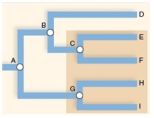
A) monophyletic
B) paraphyletic
C) polyphyletic
D) None of the answer choices are correct.

A) monophyletic
B) paraphyletic
C) polyphyletic
D) None of the answer choices are correct.

Unlock Deck
Unlock for access to all 56 flashcards in this deck.
Unlock Deck
k this deck
13
The highlighted grouping in the cladogram is a ____________ grouping. 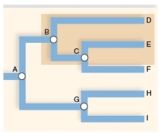
A) monophyletic
B) paraphyletic
C) polyphyletic
D) None of the answer choices are correct.

A) monophyletic
B) paraphyletic
C) polyphyletic
D) None of the answer choices are correct.

Unlock Deck
Unlock for access to all 56 flashcards in this deck.
Unlock Deck
k this deck
14
The amino acid sequences in cytochrome c were determined for chickens, ducks, and humans. Scientists found a difference of 3 amino acids between chickens and ducks, but between chickens and humans there were 13 differences. One may conclude that
A) chickens are as closely related to humans as they are to ducks.
B) chickens are more closely related to ducks than they are to humans.
C) chickens are more closely related to humans than they are to ducks.
D) None of the above.
A) chickens are as closely related to humans as they are to ducks.
B) chickens are more closely related to ducks than they are to humans.
C) chickens are more closely related to humans than they are to ducks.
D) None of the above.

Unlock Deck
Unlock for access to all 56 flashcards in this deck.
Unlock Deck
k this deck
15
Of the three domains in Woese's classification system, which do most biologists recognize?
A) Monera, Archae, and Bacteria
B) Fungi, Monera, and Archae
C) Archae, Bacteria and Eukarya
D) Protista, Fungi, and Eukarya
A) Monera, Archae, and Bacteria
B) Fungi, Monera, and Archae
C) Archae, Bacteria and Eukarya
D) Protista, Fungi, and Eukarya

Unlock Deck
Unlock for access to all 56 flashcards in this deck.
Unlock Deck
k this deck
16
In cladistics, _______________ is(are) the primary criterion used to classify organisms.
A) ecological niche
B) common ancestry
C) mating behavior
D) observable traits
E) All of the answer choices are correct.
A) ecological niche
B) common ancestry
C) mating behavior
D) observable traits
E) All of the answer choices are correct.

Unlock Deck
Unlock for access to all 56 flashcards in this deck.
Unlock Deck
k this deck
17
Whittaker's classification included Kingdom Monera, which included all prokaryotes. Why is this classification obsolete?
A) Based on fossil evidence, this group has been divided into three newly named kingdoms.
B) This kingdom now includes more organisms, so the name has been changed.
C) The prokaryotes, which were included in this kingdom, are now included in Protista.
D) Based on molecular data, Monera has been divided into the two distinct domains, Archaea and Bacteria.
A) Based on fossil evidence, this group has been divided into three newly named kingdoms.
B) This kingdom now includes more organisms, so the name has been changed.
C) The prokaryotes, which were included in this kingdom, are now included in Protista.
D) Based on molecular data, Monera has been divided into the two distinct domains, Archaea and Bacteria.

Unlock Deck
Unlock for access to all 56 flashcards in this deck.
Unlock Deck
k this deck
18
______ is the process of naming and assigning organisms to a taxon.
A) Cladistics
B) Taxonomy
C) Phylogeny
D) Classification
E) None of the answer choices are correct.
A) Cladistics
B) Taxonomy
C) Phylogeny
D) Classification
E) None of the answer choices are correct.

Unlock Deck
Unlock for access to all 56 flashcards in this deck.
Unlock Deck
k this deck
19
The highlighted grouping in the cladogram is a ____________ grouping. 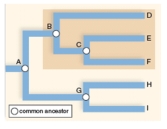
A) monophyletic
B) paraphyletic
C) polyphyletic
D) None of the answer choices are correct.

A) monophyletic
B) paraphyletic
C) polyphyletic
D) None of the answer choices are correct.

Unlock Deck
Unlock for access to all 56 flashcards in this deck.
Unlock Deck
k this deck
20
The northern copperhead is Agkistrodon contortrix contortrix, the southern copperhead is Agkistrodon contortrix mokasen, and the cottonmouth is Agkistrodon piscivorous. Therefore,
A) all are subspecies of Agkistrodon.
B) they are three distinct species.
C) the copperheads are subspecies and the cottonmouth is a separate species.
D) they are all the same species.
A) all are subspecies of Agkistrodon.
B) they are three distinct species.
C) the copperheads are subspecies and the cottonmouth is a separate species.
D) they are all the same species.

Unlock Deck
Unlock for access to all 56 flashcards in this deck.
Unlock Deck
k this deck
21
If you were using cladistics to construct a phylogenetic tree of birds, what is the best outgroup?
A) eagles
B) robins
C) bats
D) eastern bluebirds
A) eagles
B) robins
C) bats
D) eastern bluebirds

Unlock Deck
Unlock for access to all 56 flashcards in this deck.
Unlock Deck
k this deck
22
Based on this tree, mammals are as closely related to birds as they are to snakes. 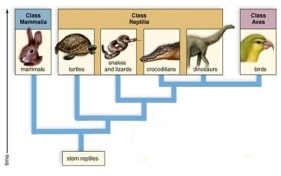


Unlock Deck
Unlock for access to all 56 flashcards in this deck.
Unlock Deck
k this deck
23
Which of the following statements about taxonomy is NOT true?
A) In cladistics, a common ancestor and all its descendents that share one or more derived traits are placed in a single clade.
B) Analogous structures are derived from a common ancestral structure to perform the same function.
C) Biochemical data and the fossil record can be used independently to indicate the length of time since two species diverged from a common ancestor.
D) Homologous structures are derived from a single structure in the ancestor, although they may be adapted to different uses in the descendent species (e.g., a dog's foreleg and a human's arm).
A) In cladistics, a common ancestor and all its descendents that share one or more derived traits are placed in a single clade.
B) Analogous structures are derived from a common ancestral structure to perform the same function.
C) Biochemical data and the fossil record can be used independently to indicate the length of time since two species diverged from a common ancestor.
D) Homologous structures are derived from a single structure in the ancestor, although they may be adapted to different uses in the descendent species (e.g., a dog's foreleg and a human's arm).

Unlock Deck
Unlock for access to all 56 flashcards in this deck.
Unlock Deck
k this deck
24
Phylogenetic trees with proportional branch lengths
A) indicate relatedness among organisms.
B) indicate the relative number of nucleotide pair differences between groups.
C) are constructed by comparing DNA sequences of homologous genes and calibrating this molecular clock with the fossil record.
D) All of the answer choices are true.
E) indicate relatedness evolutionary time.
A) indicate relatedness among organisms.
B) indicate the relative number of nucleotide pair differences between groups.
C) are constructed by comparing DNA sequences of homologous genes and calibrating this molecular clock with the fossil record.
D) All of the answer choices are true.
E) indicate relatedness evolutionary time.

Unlock Deck
Unlock for access to all 56 flashcards in this deck.
Unlock Deck
k this deck
25
A recent book by a reputable biologist suggests there is a deep, hot biosphere under the Earth's crust that may have more biomass than all life at the Earth's surface. This would primarily rely on what organisms?
A) primitive animals
B) primitive heat-loving plants
C) fungi living on the detritus from above
D) thermoacidophilic archaea
E) viruses
A) primitive animals
B) primitive heat-loving plants
C) fungi living on the detritus from above
D) thermoacidophilic archaea
E) viruses

Unlock Deck
Unlock for access to all 56 flashcards in this deck.
Unlock Deck
k this deck
26
Based on this tree, the lineage leading to ________ was the first to diverge from the other lines. 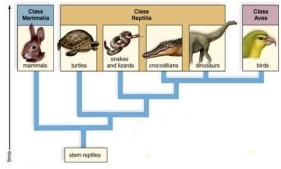
A) turtles
B) birds
C) dinosaurs
D) mammals
E) crocodilians

A) turtles
B) birds
C) dinosaurs
D) mammals
E) crocodilians

Unlock Deck
Unlock for access to all 56 flashcards in this deck.
Unlock Deck
k this deck
27
Which kingdom is correctly described?
A) Plantae: multicellular and photoautotrophic
B) Fungi: multicellular and heterotrophic by ingestion
C) Animalia: multicellular and heterotrophic by absorption
D) Protista: unicellular and heterotrophic only
A) Plantae: multicellular and photoautotrophic
B) Fungi: multicellular and heterotrophic by ingestion
C) Animalia: multicellular and heterotrophic by absorption
D) Protista: unicellular and heterotrophic only

Unlock Deck
Unlock for access to all 56 flashcards in this deck.
Unlock Deck
k this deck
28
Single celled eukaryotic cells belong to which of the following domains?
A) Eukarya
B) Fungi
C) Animalia
D) Plantae
A) Eukarya
B) Fungi
C) Animalia
D) Plantae

Unlock Deck
Unlock for access to all 56 flashcards in this deck.
Unlock Deck
k this deck
29
If there are so many million insects and so few scientists to describe them, perhaps we could just assign the insects numbers and descriptions, rather than names. Describe why this would not accomplish the same "job" as giving them a scientific name, and provide two potential items of knowledge that would be missing with just a number and description. Simply, what does naming an organism also accomplish?

Unlock Deck
Unlock for access to all 56 flashcards in this deck.
Unlock Deck
k this deck
30
All of the following are true regarding systematics EXCEPT that it
A) is the study of the diversity of organisms at all levels of organization.
B) is the specific study of identification, naming, and classification of organisms.
C) relies on data from the fossil record, homology, and molecular data.
D) utilizes protein, DNA, and RNA comparisons to determine relatedness of individuals.
A) is the study of the diversity of organisms at all levels of organization.
B) is the specific study of identification, naming, and classification of organisms.
C) relies on data from the fossil record, homology, and molecular data.
D) utilizes protein, DNA, and RNA comparisons to determine relatedness of individuals.

Unlock Deck
Unlock for access to all 56 flashcards in this deck.
Unlock Deck
k this deck
31
The evolution of organisms in the three domains and four kingdoms is most accurately described by which sequence?
A) Prokaryotes to Protists to Plants, from Plants separately to both Animals and Fungi
B) Prokaryotes to Fungi to Protists to Plants to Animals
C) Prokaryotes to Protists, from Protists separately to Fungi, Plants, and Animals
D) Protists to Prokaryotes to Fungi, from Fungi separately to Plants and Animals
E) Prokaryotes to Protists, separately to Animals and Plants with Fungi a loss of plant photosynthesis
A) Prokaryotes to Protists to Plants, from Plants separately to both Animals and Fungi
B) Prokaryotes to Fungi to Protists to Plants to Animals
C) Prokaryotes to Protists, from Protists separately to Fungi, Plants, and Animals
D) Protists to Prokaryotes to Fungi, from Fungi separately to Plants and Animals
E) Prokaryotes to Protists, separately to Animals and Plants with Fungi a loss of plant photosynthesis

Unlock Deck
Unlock for access to all 56 flashcards in this deck.
Unlock Deck
k this deck
32
The outlined group is 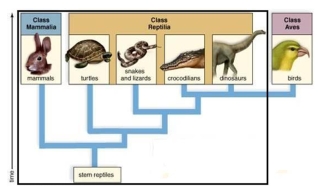
A) monophyletic.
B) paraphyletic.
C) polyphyletic.
D) monophyletic and paraphyletic are correct.

A) monophyletic.
B) paraphyletic.
C) polyphyletic.
D) monophyletic and paraphyletic are correct.

Unlock Deck
Unlock for access to all 56 flashcards in this deck.
Unlock Deck
k this deck
33
Which of the following best represents analogous structures?
A) the arm of a human and the wing of a bat
B) the arm of a human and the leg of a human
C) the wing of a butterfly and the wing of a bee
D) the wing of a bat and the wing of a butterfly
A) the arm of a human and the wing of a bat
B) the arm of a human and the leg of a human
C) the wing of a butterfly and the wing of a bee
D) the wing of a bat and the wing of a butterfly

Unlock Deck
Unlock for access to all 56 flashcards in this deck.
Unlock Deck
k this deck
34
When comparing archaea with bacteria
A) both archaea and bacteria are easily cultured and studied in the laboratory.
B) the chemical nature of the cell wall of archaea and bacteria is identical and shows their early relationship.
C) bacteria are not very diverse and are limited in distribution, while archaea are far more diverse and found everywhere.
D) the archaea and bacteria are cases of reduction in traits and are both derived from early eukarya.
E) None of the choices are true.
A) both archaea and bacteria are easily cultured and studied in the laboratory.
B) the chemical nature of the cell wall of archaea and bacteria is identical and shows their early relationship.
C) bacteria are not very diverse and are limited in distribution, while archaea are far more diverse and found everywhere.
D) the archaea and bacteria are cases of reduction in traits and are both derived from early eukarya.
E) None of the choices are true.

Unlock Deck
Unlock for access to all 56 flashcards in this deck.
Unlock Deck
k this deck
35
When ectoparasites first arrive and adapt to the fur or feathery habitat of a host, they often lose more complex ancestral features. So it is possible to gain a trait in evolution and subsequently lose it. However, it is considered vastly improbable that this same trait will again re-evolve. Therefore, in trying to trace evolutionary lineages, can we always expect the most primitive forms to be the simplest and the most advanced to be the most complex? Why or why not?

Unlock Deck
Unlock for access to all 56 flashcards in this deck.
Unlock Deck
k this deck
36
Early biologists referred to animals as ''simple" and ''advanced," but now it is more accurate to use the following terms:
A) ''allopatric" and ''sympatric," since the species is most important.
B) "generalists" and ''specialists," since this is how biologists classify characters.
C) ''simple" and ''complex," since anatomy terms are more exact.
D) ''evolved" and ''un-evolved," since everything ties together with evolution.
E) ''primitive" and ''derived," since some early forms became very complex and some evolved forms are derived from them but lost characters and are simple.
A) ''allopatric" and ''sympatric," since the species is most important.
B) "generalists" and ''specialists," since this is how biologists classify characters.
C) ''simple" and ''complex," since anatomy terms are more exact.
D) ''evolved" and ''un-evolved," since everything ties together with evolution.
E) ''primitive" and ''derived," since some early forms became very complex and some evolved forms are derived from them but lost characters and are simple.

Unlock Deck
Unlock for access to all 56 flashcards in this deck.
Unlock Deck
k this deck
37
Which of the following Domains include the majority of the organisms that were previously classified in Kingdom Monera?
A) Bacteria and Eubacteria
B) Protista and Eukarya
C) Archaea and Algae
D) Eukarya and Bacteria
E) Archaea and Bacteria
A) Bacteria and Eubacteria
B) Protista and Eukarya
C) Archaea and Algae
D) Eukarya and Bacteria
E) Archaea and Bacteria

Unlock Deck
Unlock for access to all 56 flashcards in this deck.
Unlock Deck
k this deck
38
Eels are as closely related to lizards as they are to snakes. 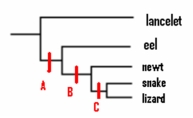


Unlock Deck
Unlock for access to all 56 flashcards in this deck.
Unlock Deck
k this deck
39
The famous Greek philosopher Aristotle could be thought of as a taxonomist since he identified and grouped organisms.

Unlock Deck
Unlock for access to all 56 flashcards in this deck.
Unlock Deck
k this deck
40
Taxonomy
A) is the branch of biology dealing with the naming, identification, and classification of organisms.
B) uses a binomial system developed by Linnaeus.
C) uses reproductive isolation as the basis of definition of a species.
D) All of the choices are correct.
A) is the branch of biology dealing with the naming, identification, and classification of organisms.
B) uses a binomial system developed by Linnaeus.
C) uses reproductive isolation as the basis of definition of a species.
D) All of the choices are correct.

Unlock Deck
Unlock for access to all 56 flashcards in this deck.
Unlock Deck
k this deck
41
Which of the following groups represent the current Domains of life?
A) Bacteria, Eukarya, Archaea
B) Bacteria, Eukarya, Monera
C) Bacteria, Eukarya, Archae
D) Eubacteria, Animalia, Archaea
A) Bacteria, Eukarya, Archaea
B) Bacteria, Eukarya, Monera
C) Bacteria, Eukarya, Archae
D) Eubacteria, Animalia, Archaea

Unlock Deck
Unlock for access to all 56 flashcards in this deck.
Unlock Deck
k this deck
42
The scientific name of the family dog is Canis familiaris. Canis represents the species _______.
A) genus name.
B) species name.
C) phylum name.
D) kingdom.
A) genus name.
B) species name.
C) phylum name.
D) kingdom.

Unlock Deck
Unlock for access to all 56 flashcards in this deck.
Unlock Deck
k this deck
43
DNA or protein can be used as a ''molecular clock" that tells how long it has been since two species have diverged from a common ancestor.

Unlock Deck
Unlock for access to all 56 flashcards in this deck.
Unlock Deck
k this deck
44
Which Domains did Kingdom Monera get divided into?
A) Archaea and Bacteria
B) Protista and Archaea
C) Bacteria and Eukarya
D) Archaea and Eukarya
A) Archaea and Bacteria
B) Protista and Archaea
C) Bacteria and Eukarya
D) Archaea and Eukarya

Unlock Deck
Unlock for access to all 56 flashcards in this deck.
Unlock Deck
k this deck
45
What is the correct order of the Linnaean system of classification, starting with the most general category?
A) Domain, Kingdom, Phylum, Class
B) Domain, Phylum, Class, Kingdom
C) Kingdom, Class, Phylum, Species
D) Genus, Order, Class, Phylum,
A) Domain, Kingdom, Phylum, Class
B) Domain, Phylum, Class, Kingdom
C) Kingdom, Class, Phylum, Species
D) Genus, Order, Class, Phylum,

Unlock Deck
Unlock for access to all 56 flashcards in this deck.
Unlock Deck
k this deck
46
New data about rRNA led to the three domain system of classification.

Unlock Deck
Unlock for access to all 56 flashcards in this deck.
Unlock Deck
k this deck
47
The principle of parsimony states that a cladogram produces the best hypothesis about relationships of organisms when the maximum number of assumptions are considered.

Unlock Deck
Unlock for access to all 56 flashcards in this deck.
Unlock Deck
k this deck
48
Which of the following lists of features exemplifies the Domain Archaea?
A) Unicellular, varying brached lipids in their cell membrane, no nuclear envelope and contain some introns
B) Multicellular, varying branched lipids in their cell membrane, no nuclear envelope and contain some introns
C) Unicellular, unbranched phospholipids in their cell membrane, no nuclear envelope and contain some introns
D) Unicellular, varying brached lipids in their cell membrane, nuclear envelope and contain some introns
A) Unicellular, varying brached lipids in their cell membrane, no nuclear envelope and contain some introns
B) Multicellular, varying branched lipids in their cell membrane, no nuclear envelope and contain some introns
C) Unicellular, unbranched phospholipids in their cell membrane, no nuclear envelope and contain some introns
D) Unicellular, varying brached lipids in their cell membrane, nuclear envelope and contain some introns

Unlock Deck
Unlock for access to all 56 flashcards in this deck.
Unlock Deck
k this deck
49
Create a list of the features used to describe members of Domain Eukarya.

Unlock Deck
Unlock for access to all 56 flashcards in this deck.
Unlock Deck
k this deck
50
Cladists feel that a cladogram is a hypothesis about the evolutionary history of a group. Using what you have learned about scientific hypotheses, support this view of a cladogram.

Unlock Deck
Unlock for access to all 56 flashcards in this deck.
Unlock Deck
k this deck
51
Which type of trait is more valuable in determining the evolutionary relationship between two organisms?
A) derived
B) ancestral
C) Both traits are equally valuable in determining the evolutionary relationship between two organisms.
D) Neither trait is useful in determining the evolutionary relationship between two organisms.
A) derived
B) ancestral
C) Both traits are equally valuable in determining the evolutionary relationship between two organisms.
D) Neither trait is useful in determining the evolutionary relationship between two organisms.

Unlock Deck
Unlock for access to all 56 flashcards in this deck.
Unlock Deck
k this deck
52
A taxon is the general name for a group of organisms that exhibit a set of shared traits.

Unlock Deck
Unlock for access to all 56 flashcards in this deck.
Unlock Deck
k this deck
53
Which of the following list best describes the features used to classify an organism as a member of Domain Bacteria?
A) Unicellular, lacking a nuclear envelope and membrane bound organelles, contains ribosomes but lacks introns
B) Unicellular, contains a nuclear envelope and membrane bound organelles, contains ribosomes but lacks introns
C) Unicellular, lacks a nuclear envelope and membrane bound organelles, contains introns but lacks ribosomes
D) Multicellular, lacks a nuclear envelope and membrane bound organelles, contains introns but lacks ribosomes
A) Unicellular, lacking a nuclear envelope and membrane bound organelles, contains ribosomes but lacks introns
B) Unicellular, contains a nuclear envelope and membrane bound organelles, contains ribosomes but lacks introns
C) Unicellular, lacks a nuclear envelope and membrane bound organelles, contains introns but lacks ribosomes
D) Multicellular, lacks a nuclear envelope and membrane bound organelles, contains introns but lacks ribosomes

Unlock Deck
Unlock for access to all 56 flashcards in this deck.
Unlock Deck
k this deck
54
DNA barcoding is a guaranteed method of determining an organisms taxonomic group. -142013

Unlock Deck
Unlock for access to all 56 flashcards in this deck.
Unlock Deck
k this deck
55
Domain Archaea is the only domain in which the organisms lack membrane bound organelles.

Unlock Deck
Unlock for access to all 56 flashcards in this deck.
Unlock Deck
k this deck
56
Convergent evolution has occurred when distantly related species have a structure that looks the same only because of adaptation to the same type of environment.

Unlock Deck
Unlock for access to all 56 flashcards in this deck.
Unlock Deck
k this deck


